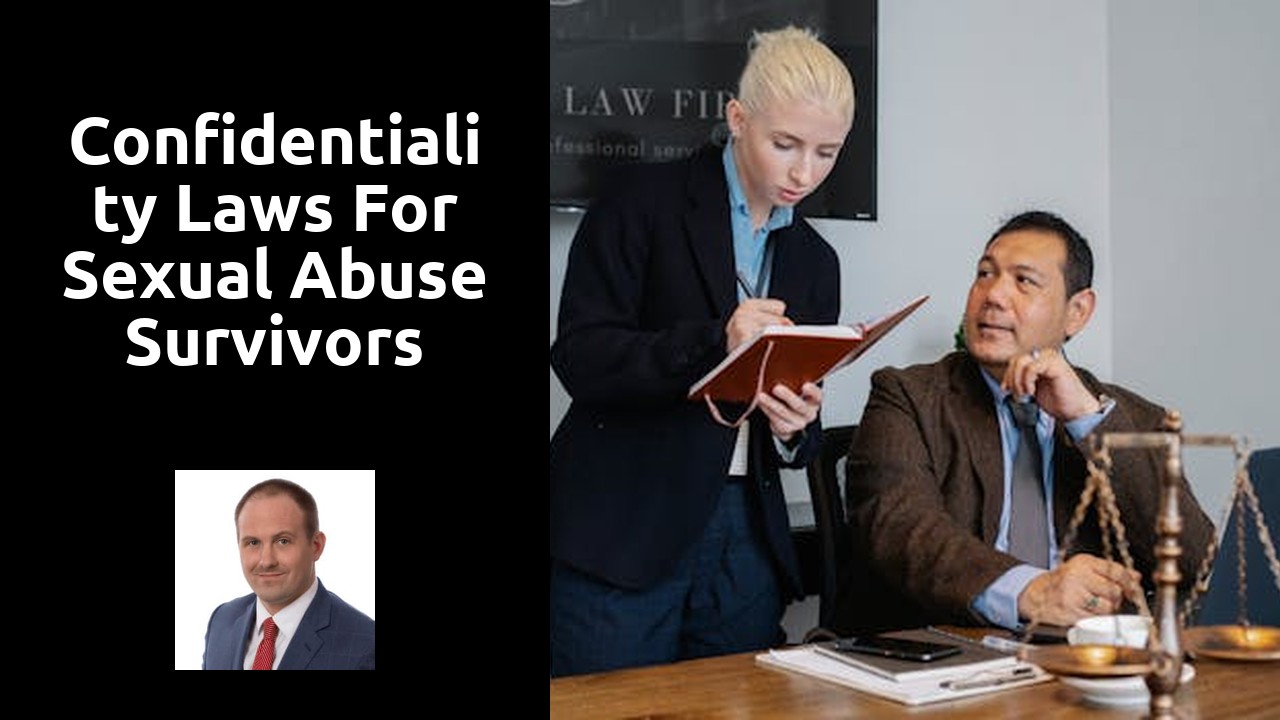Confidentiality Laws for Sexual Abuse Survivors

Table Of Contents
Confidentiality Protections in Legal Proceedings
Legal proceedings involving sexual abuse survivors often entail stringent confidentiality protections to safeguard their privacy and well-being. These protections are crucial in ensuring that survivors feel secure and empowered to share their experiences without fear of breach or exploitation. Confidentiality laws serve as a shield, shielding survivors from further harm and ensuring that their narratives are respected and handled with the utmost sensitivity.
In courtrooms and legal settings, confidentiality measures are instituted to create a safe space for survivors to disclose their experiences without facing unwarranted scrutiny or potential retraumatization. Judges, attorneys, and court personnel play pivotal roles in upholding these protections, emphasizing the importance of respecting survivors' confidentiality rights throughout the legal process.
Safeguards in place to protect survivors during legal processes
When sexual abuse survivors decide to seek legal recourse against their perpetrators, it is crucial that they are provided with safeguards to protect their privacy and well-being throughout the legal process. One key safeguard is the use of closed courtrooms or protective measures to shield survivors from potentially traumatic experiences, such as facing their abuser in open court. These protective measures aim to create a safe space for survivors to share their experiences without fear of further harm or intimidation.
Additionally, legal professionals and support staff involved in sexual abuse cases must adhere to strict confidentiality protocols to prevent any unauthorized disclosure of survivors' personal information. This includes ensuring that only individuals directly involved in the case have access to sensitive details and that information is shared on a need-to-know basis. By upholding these safeguards, the legal system can better support survivors in seeking justice while prioritizing their privacy and emotional well-being.
Confidentiality Considerations in Healthcare
When it comes to healthcare settings, confidentiality is paramount for sexual abuse survivors seeking medical assistance. Healthcare providers are bound by strict privacy laws that protect sensitive information shared by survivors. This means that any details disclosed during medical consultations or examinations must be handled with the utmost care and kept confidential to maintain the trust and safety of survivors.
Moreover, healthcare professionals play a crucial role in creating a safe and supportive environment for survivors. By upholding confidentiality laws and reassuring survivors of their privacy rights, providers can help survivors feel more comfortable and empowered to seek the assistance they need. Being mindful of the legal and ethical obligations regarding confidentiality is essential in ensuring that survivors receive the care and support necessary to navigate the healing process.
How healthcare providers navigate confidentiality laws with sexual abuse survivors
Healthcare providers play a crucial role in upholding the confidentiality of sexual abuse survivors while providing them with necessary medical care. Ensuring privacy and trust is paramount in fostering a safe environment for survivors to disclose their experiences without fear of information leakage. In navigating confidentiality laws, healthcare professionals must adhere to strict guidelines to maintain the confidentiality of survivors' sensitive information.
Healthcare providers are bound by laws and ethical standards that require them to keep survivors' information private unless consent is given or there is an imminent risk of harm. This delicate balance between ensuring confidentiality and taking necessary actions to protect survivors from further harm requires healthcare professionals to exercise sound judgment and follow established protocols. By carefully following confidentiality laws and respecting survivors' privacy rights, healthcare providers can create a supportive and secure environment for survivors to seek help and begin their healing journey.
Confidentiality Best Practices
Maintaining confidentiality is of utmost importance when it comes to supporting sexual abuse survivors. One critical aspect of best practices is ensuring that only the necessary individuals have access to sensitive information. This includes limiting information sharing to those directly involved in the survivor's care or legal proceedings, and obtaining explicit consent before disclosing any details.
Another key best practice is to store all confidential information securely and to adhere strictly to data protection laws. Healthcare providers and legal professionals must take precautions to prevent unauthorized access to sensitive information, whether in physical or digital form. Implementing robust security measures and regularly reviewing and updating confidentiality policies are essential steps in safeguarding survivors' privacy and building their trust in the support system.
Recommendations for maintaining confidentiality while supporting survivors
To uphold confidentiality while supporting survivors of sexual abuse, it is crucial for professionals to prioritize the individual's privacy and ensure that sensitive information remains secure. This can be achieved by implementing strict protocols for handling and storing confidential data, limiting access to authorized personnel only. Additionally, maintaining open communication with survivors about the importance of confidentiality can help establish trust and reassure them that their information will be safeguarded.
Furthermore, it is essential for professionals to stay informed about current confidentiality laws and regulations to ensure compliance and protect survivors from any potential breaches of privacy. Regular training sessions and ongoing education can help professionals navigate the complex legal landscape surrounding confidentiality in a sensitive and effective manner, ultimately providing survivors with the support and protection they deserve.
FAQS
What are confidentiality protections for sexual abuse survivors in legal proceedings?
Confidentiality protections in legal proceedings ensure that survivors' identities and personal information are safeguarded to maintain privacy and security.
What safeguards are in place to protect survivors during legal processes?
Safeguards such as protective orders, closed hearings, and restrictions on the disclosure of sensitive information help protect survivors' confidentiality during legal processes.
How do healthcare providers navigate confidentiality laws with sexual abuse survivors?
Healthcare providers must adhere to strict confidentiality laws while providing care to sexual abuse survivors, ensuring their information is kept private and secure.
What are some recommendations for maintaining confidentiality while supporting survivors?
Best practices include obtaining informed consent, limiting access to confidential information, and securely storing records to protect the confidentiality of sexual abuse survivors.
Related Links
Arkansas sexual abuse lawyer representing survivorsWhat is 4th degree sexual assault in Arkansas?
Mandatory Reporting Laws for Sexual Abuse in Arkansas